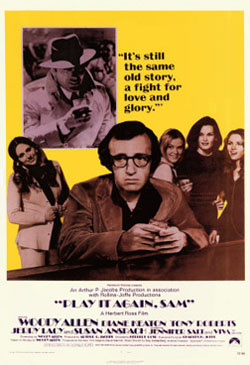
PLAY IT AGAIN, SAM
US, 1972, 81 minutes, Colour.
Woody Allen, Diane Keaton, Tony Roberts, Susan Anspach, Jennifer Salt, Viva, Joy Bang.
Directed by Herbert Ross.
Comedians are generally acquired tastes. Woody Allen fans stand by him at all times. Here he probably succeeds in entertaining more than his fans in a story of a Bogart-fan movie writer whose marriage has broken up and who receives help from a best friends married couple and the spirit of Bogart. Little man Woody poses, sets up barriers, but ultimately has to learn to accept and be himself. This, plus funny lines, sight jokes and a parody parallel of Casablanca, all in 80 minutes or so. make this a worthwhile American comedy.
1. This film had many allusions to Humphrey Bogart? Did it matter if an audience did not understand all these references? Could they have enjoyed the film without too much knowledge about Humphrey Bogart?
2. The film was a satire. How good a satire was it? Satires are moralising. In what way did this film moralise?
3. Allan was the central character - what kind of a man was he? Woody Allen as the 'Little Man', the ordinary little American man - the man who does not think he is much in his own eyes? The man who puts on masks to succeed? The American who is influenced by films and tends to take films as realities? Did you like Allan? Was he likeable? Why did he think he was not likeable?
4. Comment on the structure and techniques of the film, especially the screening of Casablanca during the credits and the parody parallel at the end. Effectiveness of the imagination of Allan and the effectiveness of the parody of Bogart films. of other styles of films e.g. at the end. the confrontations between Dick and Allan?
5. How effective was the introduction of the spirit of Humphrey Bogart? Did Jerry Lacey do a good impersonation of Bogart? Did he represent the screen Bogart well? His attitudes? The point of the advice that he gave to Allan? Was it always worth following? Nancy shooting the spirit of Bogart dead ?and he revived!
6. Linda and Dick as persons? Dick always on the phone (humorous?)? Dick as a typical American businessman with his neglect of and love for his wife? His blindness to what was going on? Linda as a typical U.S. wife, was she likeable? Did the audience like her?
7. Why did Linda and Allan get on so well together? Why did Allan not have to pretend with Linda? What insight did this give to Allan about Linda and himself? Were you surprised at their affair?
8. The ending was a parallel of Casablanca, did it really contain truth for the resolution of their story? Note especially Linda's final speech to Allan about his not having to pretend?
9. How did the film comment on and satirise American attitudes towards sex? Allan's preoccupation, his marriage and break-up, Nancy's attitude towards marriage and her reasons for breaking the marriage? Allan's preoccupation with dating and making an impression? Allan's encounters with the women he dated: Sharon and his awkwardness? Jennifer and her artificiality? The girl from the office and the encounter with the bikies?
10. What kind of a person was Nancy? Why did she and Allan marry? Was the marriage effective for Allan? Comment on the meeting with Nancy in the shop at the end of the film. Comment on Allan's imagining Nancy - at home, on the bed in the supermarket, shooting Bogart?
11. What values did the film uphold? The film was a comedy. How great a comedian is Woody Allen? Why? What aspects of his humour are the most successful - image, awkwardness, 'little man' situations’, dialogue? quips, wit, parodies, contemporary satire? How wise was this film?